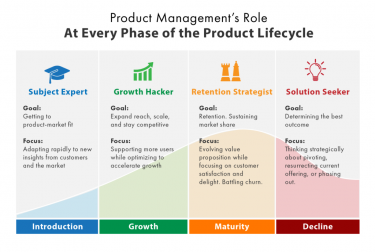
#newinteam #neu-im-team #productmanagement
13. Aug. 2020 |
- min Lesezeit
There is hardly any job which differs so much from company to company such as the Product Managers role. If you are looking for your next company to join or if you are a company looking for your next Product Manager, it is worth knowing which type of product you are talking about. In general, there are 3 characteristics of software products which have a strong effect on the Product Managers role:
In B2B you tend to have only a few customers, which each have strong feature requests. In addition the engineers tend to know very little about the industry. Unlike in B2C where you can get by with good user research, in B2B Product Managers need to have a profound industry knowledge. You cannot rely on data since there is not much data available. Instead B2B Product Managers require market research skills and in-depth customer interviews to become the industry expert. Another unique requirement is that B2B Product Managers often need to focus on the buyer which is very often not the user in contrast to B2C Product Managers who focus on the users only. Since business tend to make plans, strong roadmapping skills are also required.
In B2C on the other hand you have a lot of data available. Data-driven PMs can therefore do very well working on consumer products because they’re able to make a strong case for their proposals, and they often can come up with features that will make a difference to the core metrics the company cares about.
Shipped products describe software which has to be shipped, such as an app in the app store or a desktop application. Web-based products refer to products such as websites or progressive web-apps. The main difference is that with shipped products you are bound to longer release cycles since it is harder to update once released. Therefore shipped products require much more coordination between teams. Therefore, product Managers have to rely much more on project management and communication skills.
Web-based products on the other hand allow quick experimentation, since changes can be quickly implemented and undone. It is common to derive an experiment, implement an A/B test and draw conclusions based on the evidence. Product Managers therefore need to be more fluent in data analysis and designing good experiments.
In addition, there are also the different lifecycle stages which you need to consider. Product Plan has summed it up in one concise graphic

In general, the early stages of a product require more discovery skills and Product Managers who are comfortable with quick and dirty execution. Later stages, on the hand, provide the advantage that there is already a product and a huge user base available. Therefore, data wrangling skills are much more needed since Product Managers are working mostly on optimizations and improvements.
If you are searching for a Product Manager be aware what kind of product you have and what the requirements are. Just because a candidate has 10 years of B2B Product Management experience doesn't make him a good fit for an early stage B2C startup. On the other hand, if you are a Product Manager choose wisely on what type of product you will work on. If you are data driven, good with numbers for example, it is likely that your skills will thrive in a B2C, web-based product environment. Of course this applies as well when you want to learn certain skills.
